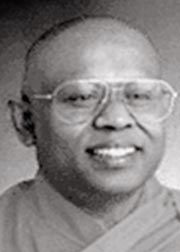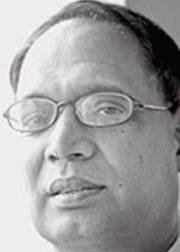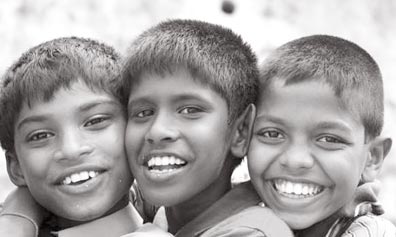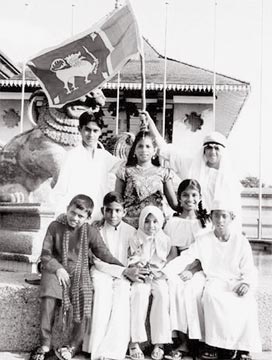|
Dr. Noel Nadesan tells LLRC:
Divisive politics not communal bitterness, cause of conflict
By Shanika SRIYANANDA
 |
 |
| Ven. Walpola Piyananda
Thera |
Dr. Noel Nadesan |
"I want to be a Sri Lankan as well as a Tamilian. I don't want to
lose my Sri Lankan identity and become a Tamilian or vice versa" quoting
Prof. K. Sivathamby, a prominent academic of the Jaffna University, Dr.
Noel Nadesan told the Lessons Learnt and Reconciliation Commission LLRC
that an independent Tamil Eelam within the island is virtually dead and
buried and those who are still trying to pursue it are living in a world
of fantasy.
"Those who are still actively scheming to resurrect Tamil Eelam
should be aware that they are also simultaneously digging a mass grave
for the Tamils in Sri Lanka", he said in his testimony to the LLRC,
based on 'Reject the past, invest only in the future'.
Dr. Nadesan, a veterinarian had witnessed the 83 riots while working
in Medawachchiya and migrated to Australia said he was reluctant to
leave his own country, but the experiences had forced him to do so.
Testifying before the eight-member Commission headed by former
Attorney General C.R. de Silva, he said that Tamils in the North and the
East were made to believe they were second class citizens in Sri Lanka
by Tamil politicians since 1948 and they held not only the Sri Lankan
government, but the Sinhalese also responsible for that.
President Mahinda Rajapaksa had appointed the LLRC to look into the
failure of the Norwegian-brokered Ceasefire Agreement, the root causes
of the conflict and measures to prevent future conflicts.
 Dr. Nadesan said the Tamil problem was twofold - real and perceived.
The real problem, as he cited, was making Tamil the second language in
1956, thus denying Tamils the privilege of functioning or interacting
with the State in their mother tongue overnight. Dr. Nadesan said the Tamil problem was twofold - real and perceived.
The real problem, as he cited, was making Tamil the second language in
1956, thus denying Tamils the privilege of functioning or interacting
with the State in their mother tongue overnight.
"The introduction of language-based admission to universities in 1972
further alienated the Tamils and led to militancy among the Tamil youth.
The present Government has understood this problem and is trying to
rectify the issue", he said.
Dr. Nadesan, who is a member of the Tamil Diaspora dialogue team
working towards reconciliation, peace and rehabilitation, said communal
riots during 1958, 1977 and 1983 were not caused by bitter rivalry among
the two communities, but due to the failure of the governments of the
day to maintain law and order.
"The fact that there were no communal riots after 1983 proves that
government action and vigilance are necessary for the maintenance of law
and order. Most of the violence was politically motivated and driven
from the top rather than from the bottom. The 30-year conflict was waged
from both sides based more on divisive politics than on communal
bitterness", he said.
He said the task for both the Sinhalese and Tamils was to leave the
past behind and handle the new challenges. He said any degree of
devolution, grudgingly accepted because of external pressure, was likely
to be meaningless as the 13th Amendment.
Separate State
 "Seeking Indian pressure to force the Sri Lankan Government on issues
relating to devolution and power sharing will definitely prove
counter-productive for the Tamils", he said adding that the Tamils or
those who claimed to represent them waged a prolonged war for a separate
state, which ended with no gains, but debilitated the Tamils to an
unimaginable extent. "Seeking Indian pressure to force the Sri Lankan Government on issues
relating to devolution and power sharing will definitely prove
counter-productive for the Tamils", he said adding that the Tamils or
those who claimed to represent them waged a prolonged war for a separate
state, which ended with no gains, but debilitated the Tamils to an
unimaginable extent.
Dr. Nadesan said the time has come to define clearly the political
objectives of Tamils. "Do the Tamils want power for the sake of grabbing
political power and territory or for the sake of improving the quality
of lives, living in harmony and peace in a multi-cultural society?", he
questioned.
He told the LLRC panel that recent history when Tamils threw all
their might into carving out a separate state has failed, and only those
who refuse to see the grim consequences caused to the Tamils will boast
of going down that disastrous path again. "Our future political course
must first take into consideration the lessons learnt from the total
failure of our leaders who took the Tamils to the lowest depths in their
history", he said.
Dr. Nadesan said he doesn't want future generations of Tamils to go
through what he and his fellow Tamils had gone through for over 30
years, ending in Nanthikadal. "The Tamils are sick of violence", he
said.
He said it was clear that 2010 was not the same as 1983 and the need
was for all Tamils to be like Murali - a team player fighting shoulder
to shoulder with other communities for common goals.
Explaining what Tamils need to recover from the devastation of the
decades old conflict, he said rather than language, culture, religion
and concepts of homeland, the Tamils now need day-to-day survival.
"There are Tamils who have yet failed to understand the situation in Sri
Lanka. The Tamils have been debilitated to an extent that day-to-day
survival has become a priority to a large number. The need to find food,
shelter, health-care, livelihood and other basics of plain existence far
outweigh the need to exercise power over their affairs as articulated by
their so-called leaders. The hunger for power left by their so-called
leaders and leadership aspirants does not reflect the sentiments of the
Tamils at large", he said.
Quoting Prof. Sivathamby he said over 90 percent of the Tamils do not
want Eelam.
Change of attitude
"The Tamils yet persisting with the demands of yesteryear do not
understand that the attitude of the Sinhalese towards the minorities
have changed. The other welcome development is that the shift from 1956
to 2010 has brought about a new realisation among the enlightened
Sinhala community that the Tamil grievances need to be addressed within
the framework, of a unitary Sri Lanka", he pointed out.
"Having experienced the war and seen the aftermath, they empathise
with the Tamils. The Rajapaksa Government has shown all signs of moving
in this direction. When the Rajapaksa government talks of a homespun
solution, it is articulating a desire to find a solution that will
address the aspirations of all communities. Models of devolution imposed
from outside may not satisfy these criteria. But I believe that a new
model of nation-building has begun. The window of opportunity that has
opened for all minorities including the Tamils should not be missed this
time", he stressed.
Dr. Nadesan said Tamils had to compromise and move away from their
failed past to achieve attainable goals. The Tamils cannot talk the
language of a minority with a majority complex any more. "In my opinion,
the best solution to resolve minority - majority issues is not through
confrontation, but through cooperation and consensual politics", he
said.
"If we look back, we can see we have gained most by being in
mainstream politics than in finding new routes to Nanthikadal. I think
all communities have a bright future if they abandon their bleak past",
he said spelling out his suggestions for all communities to feel equal.
Dr. Nadesan said under no circumstances should Tamils resort to
violence; they need to find a new leadership that would guide the Tamils
into mainstream democratic politics.
"Any other course of action would drag us further back into a place
worse than Nanthikadal", he said.
The Chief Sangha Nayake of America and President of the Sri Lanka
Sangha Council of America and Canada Ven. Walpola Piyananda Thera, in
his testimony to the LLRC, proposed to all citizens of Sri Lanka to
identify themselves as 'Sri Lankans' and not by their ethnicity.
Ven. Piyananda Thera accused the pro-LTTE Tamil Diaspora of raising
funds - not only for the LTTE's armed conflict, but for financing very
sophisticated public relations campaigns against Sri Lanka.
"A perfect example is the hiring of Bruce Fein, a former US Deputy
Attorney based in Washington DC. Various LTTE front organisations in the
US and Canada used him and are still using him, paying him large monthly
retainers. Pro-LTTEers engaged and are still engaged in writing and
publishing articles against the Government, filing lawsuits against key
members of the government leadership and lobbing influential members of
the US Congress", he said.
World media arena
The Thera said the Government was not effective in defending itself
in the crucial world media arena. "Neglecting to hire professional media
strategists and experts to manage their "spin", they instead relied on
Sri Lankan embassy staff around the world who had little, if any,
experienced or expertise to be able to generate positive
counter-messages. When the embassies did hire "media professionals"
these were usually Sri Lankan expatriates who lived in that country.
These individuals did not have the experience, credentials, or contacts
with the media companies of those countries that shaped world opinion -
even though they may be highly qualified in Sri Lanka. The results were
completely ineffective", he said.
Ven. Piyananda Thera said there were some politicians from Opposition
parties who travel abroad, spreading negative or false information -
rumours - about Sri Lanka. "The information disseminated against Sri
Lanka by these self-serving individuals has severely hurt Sri Lanka's
image overseas", he said.
He said there had been numerous cases of Sri Lankan Tamils - as well
as Sri Lankan Sinhalese - seeking political asylum in foreign countries
by claiming persecution and brutality by the Government. "To obtain
asylum and permanent refugee resident status in these countries, many of
them told false, greatly exaggerated negative stories about their
treatment back home. These horror stories have influenced the official
policy of these countries with regard to Sri Lanka - as well as public
opinion and the media - in a variety of deleterious ways", he said.
The Thera recommended the development of a standardised non-religious
program for all public schools, in which loving-kindness is practised as
a group at the beginning of each day, developing an exchange student
program between the North and South during school holidays order to
promote better understanding between ethnic groups, issuing important
documents such as birth certificates all three languages so that no one
feels left out, giving Tamils who are interested in becoming Buddhist
Monks and Nuns the opportunity to do so. NGOs should be licensed and
regulated, and adhere to a strict policy of non-interference in the
internal affairs of the State, he said. |

